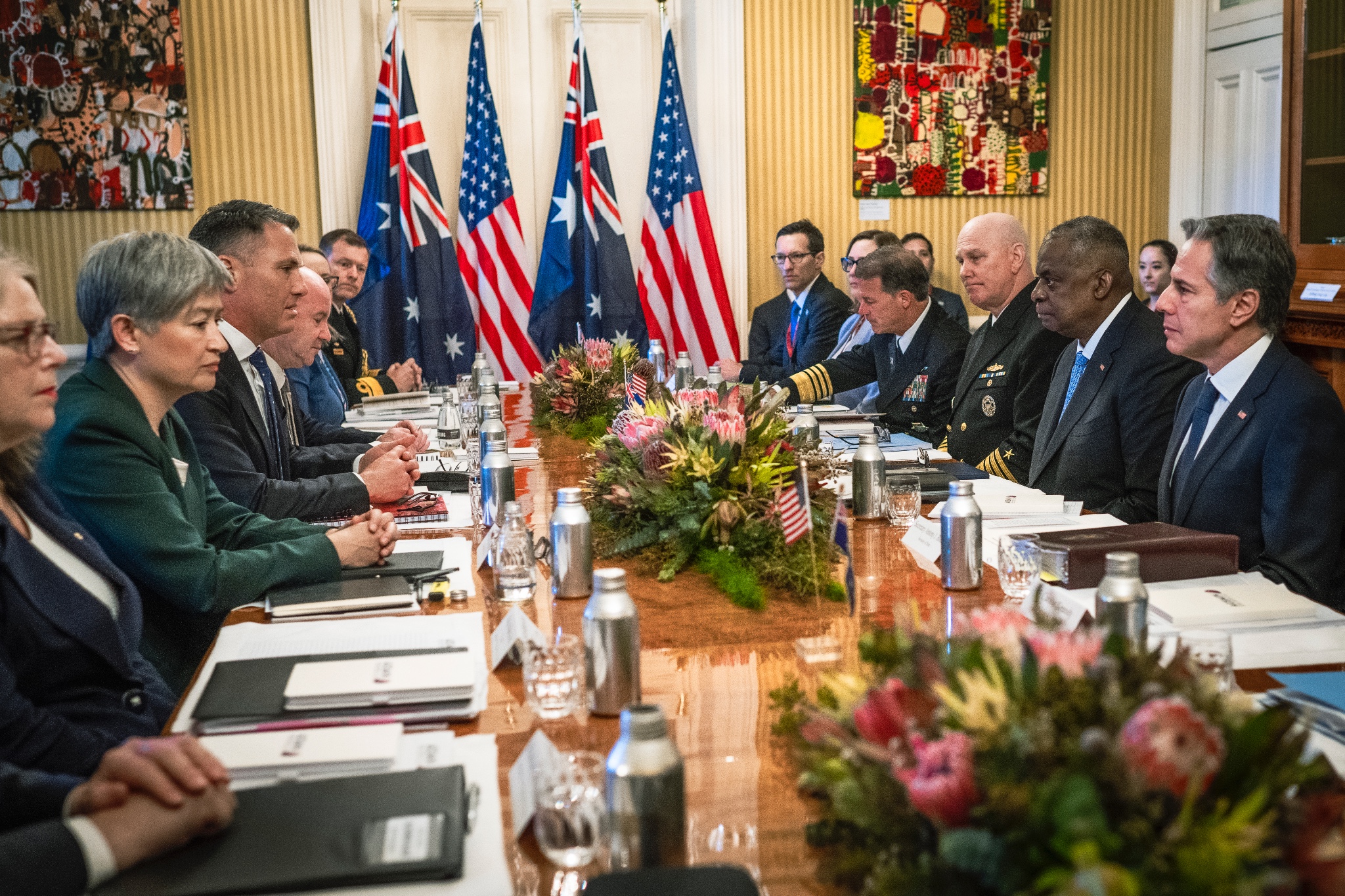 Secretary of State Antony Blinken, Prime Minister of Australia, Anthony Albanese, and others meet. Image courtesy DoD.
Secretary of State Antony Blinken, Prime Minister of Australia, Anthony Albanese, and others meet. Image courtesy DoD.
US-China Tensions Warrant Examining Australia’s Ties to Both
Wine, Tasmanian devils, and Kung Fu Panda all were topics of discussion during last week’s diplomatic sessions between Australian Prime Minister Anthony Albanese and Xi Jinping. The first visit from an Australian prime minister in seven years soon shifted to more serious subjects, such as a commitment to strengthening ties through areas of shared interest such as free trade, reciprocal visas, and fighting climate change. As relations between the two states warm up, inconsistent messaging from Australian officials over Taiwan, economic competition, and regional diplomacy are causes for concern. Due to an increased US presence in the Indo-Pacific being vital to countering Chinese influence in the region, something that threatens US allies and sea lines of communication (SLOC), a strong American-Australian relationship cannot be taken for granted.
Despite ongoing tensions between the US and China, relations between the US and Australia have remained strong. After all, Australia and the US have fought together in every major conflict since World War I. Both states belong to several shared treaties, such as ANZUS, a mutual security treaty meant to protect against threats in the Pacific and shared with New Zealand, and AUKUS, a security partnership also shared with the United Kingdom. While Australia and China share a strategic partnership, economic ties, and cultural ties, relations have been tense the past few years due to calls in April 2020 by then-Australian Prime Minister Scott Morrison to investigate the origins of COVID-19, which led to Chinese sanctions.
Australia’s location makes it strategically important for US operations in the Indo-Pacific. In addition to providing access to SLOC and housing two US bases, several facilities under construction will soon support US and Australian joint training sessions. Despite this, Australian officials have been inconsistent regarding their willingness to defend Taiwan in recent years. In 2021, Australia’s Defence Minister at the time, Peter Dutton, said it was inconceivable that Australia wouldn’t join the US in any action it took if China were to invade the island nation. That year, the Parliament remained neutral on whether Taiwan could join the Comprehensive and Progressive Agreement for Trans-Pacific Partnership (CPTPP). In March, current Defence Minister Richard Marles said Australia had not promised to join the US in a military defense of Taiwan. PM Albanese has also stated that Australia is unwilling to support Taiwan joining CPTPP due to the partnership being for recognized nation-states only, though this language is not written in the CPTPP.
Another area of concern is Chinese-Australian socioeconomic ties. While the US remains Australia’s primary investment partner, the growth rate of Chinese investment is now more than twice that of the US. China was Australia’s largest trading partner for both imports and exports last year, despite Chinese sanctions still in place. As a result, the Australian Lowy Institute Surveys of Australian citizens demonstrate that perceptions of both the US and China are changing. When asked where they saw the US and China in a decade, 61% saw China playing a more important and powerful role, while 10% saw it playing less of one. For the US, it was 22% and 32% respectively. When asked between 2022 and 2023 if China was more of a security threat or an economic partner, the percentage of those who believed China was more of an economic partner rose, while the percentage of those who thought it was more of a security threat dropped. When asked a variety of questions related to the US, Australians showed less support for the US than they did in 2022.
Australia remains one of the US’s strongest allies, but these trends are concerning. Socioeconomic trends that result in a stronger China and a weaker US can affect the parties Australians vote for when it comes to foreign policy. If these parties begin prioritizing stability and growth in the Indo-Pacific over economic commitments with the US, this could lead to a decline in sanctions enforcement or even a lapse in security cooperation. We are already seeing this trend start to emerge: PM Albanese, who is a member of Australia’s Labor Party, and his interactions so far with China are a stark contrast when compared with those of his predecessor, former PM and member of the Liberal Party Scott Morrison. Should the US need to stage a military defense of Taiwan, it is no longer clear whether Australia would put boots on the ground.
Relations between countries fluctuate, but awareness of these changes is crucial to prevent deterioration in the security relationship. Australia is an ally the US cannot afford to lose in the face of Chinese threats to Taiwan and the disputed territory claims in the South China Sea. The State Department should both continue and deepen existing commitments where possible. Discussions over mutual trade benefits (including potential ways to help protect Australia in the event of another trade war), continued discussions on what will be done should Taiwan be threatened, and strengthening military ties with Australia are more important than ever.





